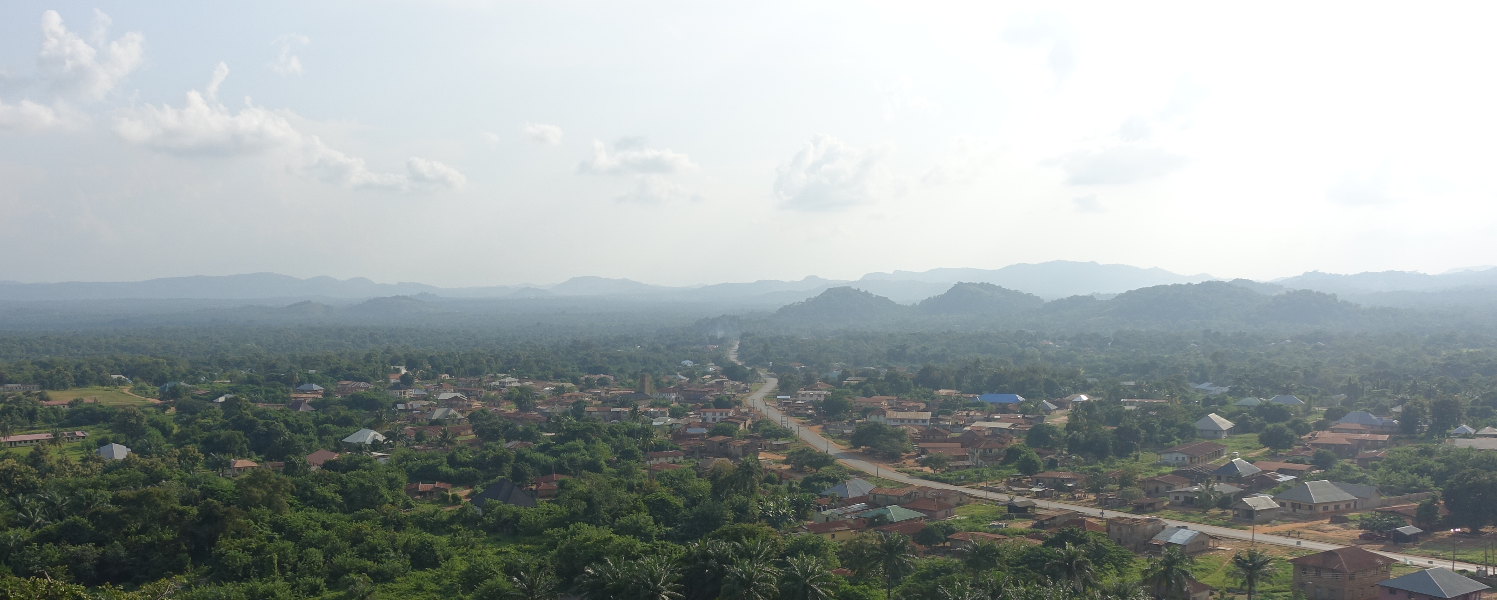Ikaram
The fieldwork for this grammar was carried out in Ikaram, a town of around 5000 inhabitants. Along with the seven of the other Abesabesi-speaking settlements, it is located at 7°36'38.2896''N, 5°51'49.0752''E in the Akoko North West Local Government Area (LGA), the northernmost LGA of Ondo State in Nigeria. It stretches along a road that connects Owo in Ondo State with Kabba in Kogi State, which can be used to drive between Lagos and Abuja.
As other parts of the Akoko area, Ikaram is surrounded by hills, forest and farm land. Boyd (2009, p. 47) classifies the area as "derived guinea savanna" with a rainy season from March/April to October/November. The economy is characterized by farming and virtually everyone cultivates farmland. Some for a living and others for their own subsistence. Cash crops are yam and cassava (mainly in the form of gari, the fermented and roasted cassava flour) and corn. Crops that are mainly used for self-subsistence are melons, guinea corn, tomatoes, pepper, beans and various leafy vegetables. Livestock include goats, sheep, turkeys and chickens that are held within the village. Cattle is held by Fulani tribes outside the village. Ikaram has two markets that take turns and operate every five days.
Ikaram has a relatively well-developed infrastructure. It is situated on a main road connecting major cities, has daily public transport to regional centers, a health center, several primary and secondary schools and access to the national electricity grid. However, infrastructure problems that are common to the whole nation, such as continual power failures, poor conditions of streets and the lack of safety on roads due to armed robbers and kidnapping, also affect Ikaram.
The town is composed of five quarters: Ayeteju, Itabalogun, Iyoke, Iyotu and Oyagi. Two of those quarters have a different name in the Ekiromi dialect of Abesabesi: Ayeteju is called ɔ̀ʃùgù and Itabalogun is called ìtùjò. Agoyi (2013, p. 72) mentions that each of these quarters used to be independent with their own king until 1885, when the Akala Akombo Momodu of Iyotu joined them together and started to rule over the whole of Ikaram. Akala is the title given to the king of Ikaram. Abimboye (2008, p. 7-9), however claims the founding father of Iyotu already arrived with a crown and thus ruled over the whole of Ikaram. He presents a line of succession starting with the son of the founding father and ending with the ruling king at date of publication. It includes 12 kings. The last king has died and is followed by the presently ruling king, the Akala Andrew Momodu.
In terms of confessions, the people of Ikaram are Muslim or belong to one of the various Christian denominations that are popular in Nigeria. While Islam reached the Akoko area through the Nupe invasion, Christianity entered the Nigeria's Southwest through European missionaries and expanded through Yoruba missionaries to the Akoko. I had no access to figures, but I am estimating that about a half of the population is Muslim and the other half Christian. Both religions are rather common in the Yoruba dominated area of Nigeria. There are elements of the traditional belief, which is still practiced today but usually only in addition to the Christian or Muslim confession. This traditional belief bases on the Yoruba religion and incorporates local deities and customs. The local deity of Ikaram is called òtòlòm and attributed to a pond within the town area. It is worshiped at a dedicated shrine, where a chief priest is in charge of ceremonies.
Customs specific to the place are a local masquerade called abug and a festival abog. The festival was dedicated for mature girls to get married but is not practiced anymore. Dances associated to the festival, however, are still performed at the New Yam festival (imùnaǹ in Ekiromi).
